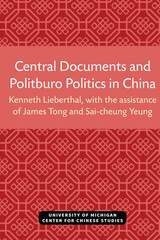

What will China look like in 2000? Tectonic forces are at work and its seeming stability has been largely lost after Tiananmen Square. Changing political, social, economic, intellectual, and cultural conditions are transforming China and its neighbors with a majority Chinese population. The authors in this book, taking full advantage of the new freedom of inquiry, shed light on the Chinese experience, elaborating not only on the vast changes sweeping all sectors of Chinese society, but also on the tradition that has persisted. As communism did not erase the past, so new experiences build on the past and tease out newness with great resemblances. Modernity takes many forms, memory repressed for a time may reassert itself; myth, the invention of individuals and collectivities, may be more powerful than prosaic fact. Cultural factors as agents of change appear more important than ever.
This book demonstrates that today Confucian societies have salient features on a restless landscape. The authors confine themselves to enduring questions about today’s Sinic societies so that educated readers and scholars of modern China and the Chinese will better understand the more populous half of the world. Contributing authors include William P. Alford, David E. Apter, Myron L. Cohen, Edward Friedman, Tongqi Lin, Perry Link, Andrew J. Nathan, Benjamin I. Schwartz, Tianjian Shi, Helen F. Siu, Wang Gungwu, and Ying-shih Yü.

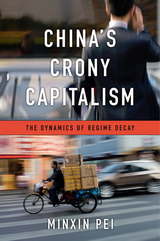
When Deng Xiaoping launched China on the path to economic reform in the late 1970s, he vowed to build “socialism with Chinese characteristics.” More than three decades later, China’s efforts to modernize have yielded something very different from the working people’s paradise Deng envisioned: an incipient kleptocracy, characterized by endemic corruption, soaring income inequality, and growing social tensions. China’s Crony Capitalism traces the origins of China’s present-day troubles to the series of incomplete reforms from the post-Tiananmen era that decentralized the control of public property without clarifying its ownership.
Beginning in the 1990s, changes in the control and ownership rights of state-owned assets allowed well-connected government officials and businessmen to amass huge fortunes through the systematic looting of state-owned property—in particular land, natural resources, and assets in state-run enterprises. Mustering compelling evidence from over two hundred corruption cases involving government and law enforcement officials, private businessmen, and organized crime members, Minxin Pei shows how collusion among elites has spawned an illicit market for power inside the party-state, in which bribes and official appointments are surreptitiously but routinely traded. This system of crony capitalism has created a legacy of criminality and entrenched privilege that will make any movement toward democracy difficult and disorderly.
Rejecting conventional platitudes about the resilience of Chinese Communist Party rule, Pei gathers unambiguous evidence that beneath China’s facade of ever-expanding prosperity and power lies a Leninist state in an advanced stage of decay.

As the world is drawn together with increasing force, our long-standing isolation from—and baffling ignorance of—China is ever more perilous. This book offers a powerful analysis of China and the transformations it has undertaken since 1989.
Wang Hui is unique in China’s intellectual world for his ability to synthesize an insider’s knowledge of economics, politics, civilization, and Western critical theory. A participant in the Tiananmen Square movement, he is also the editor of the most important intellectual journal in contemporary China. He has a grasp and vision that go beyond contemporary debates to allow him to connect the events of 1989 with a long view of Chinese history. Wang Hui argues that the features of contemporary China are elements of the new global order as a whole in which considerations of economic growth and development have trumped every other concern, particularly those of democracy and social justice. At its heart this book represents an impassioned plea for economic and social justice and an indictment of the corruption caused by the explosion of “market extremism.”
As Wang Hui observes, terms like “free” and “unregulated” are largely ideological constructs masking the intervention of highly manipulative, coercive governmental actions on behalf of economic policies that favor a particular scheme of capitalist acquisition—something that must be distinguished from truly free markets. He sees new openings toward social, political, and economic democracy in China as the only agencies by which the unstable conditions thus engendered can be remedied.
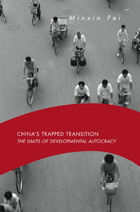
The rise of China as a great power is one of the most important developments in the twenty-first century. But despite dramatic economic progress, China’s prospects remain uncertain. In a book sure to provoke debate, Minxin Pei examines the sustainability of the Chinese Communist Party’s reform strategy—pursuing pro-market economic policies under one-party rule.
Pei casts doubt on three central explanations for why China’s strategy works: sustained economic development will lead to political liberalization and democratization; gradualist economic transition is a strategy superior to the “shock therapy” prescribed for the former Soviet Union; and a neo-authoritarian developmental state is essential to economic take-off. Pei argues that because the Communist Party must retain significant economic control to ensure its political survival, gradualism will ultimately fail.
The lack of democratic reforms in China has led to pervasive corruption and a breakdown in political accountability. What has emerged is a decentralized predatory state in which local party bosses have effectively privatized the state’s authority. Collusive corruption is widespread and governance is deteriorating. Instead of evolving toward a full market economy, China is trapped in partial economic and political reforms.
Combining powerful insights with empirical research, China’s Trapped Transition offers a provocative assessment of China’s future as a great power.
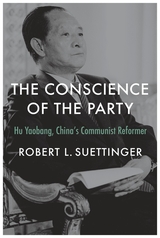
The definitive story of a top Chinese politician’s ill-fated quest to reform the Communist Party.
When Hu Yaobang died in April 1989, throngs of mourners converged on the Martyrs’ Monument in Tiananmen Square to pay their respects. Following Hu’s 1987 ouster by party elders, Chinese propaganda officials had sought to tarnish his reputation and dim his memory, yet his death galvanized the nascent pro-democracy student movement, setting off the dramatic demonstrations that culminated in the Tiananmen massacre.
The Conscience of the Party is the comprehensive, authoritative biography of the Chinese Communist Party’s most avid reformer and its general secretary for a key stretch of the 1980s. A supremely intelligent leader with an exceptional populist touch, Hu Yaobang was tapped early by Mao Zedong as a capable party hand. But Hu’s principled ideas made him powerful enemies, and during the Cultural Revolution he was purged, brutally beaten, and consigned to forced labor. After Mao’s death, Hu rose again as an ally of Deng Xiaoping, eventually securing the party’s top position. In that role, he pioneered many of the economic reforms subsequently attributed to Deng. But Hu also pursued political reforms with equal vigor, pushing for more freedom of expression, the end of lifetime tenure for CCP leaders, and the dismantling of Mao’s personality cult. Alarmed by Hu’s growing popularity and increasingly radical agenda, Deng had him purged again in 1987.
Historian and former intelligence analyst Robert L. Suettinger meticulously reconstructs Hu’s life, providing the kind of eye-opening account that remains impossible in China under state censorship. Hu Yaobang, a decent man operating in a system that did not always reward decency, suffered for his principles but inspired millions in the process.
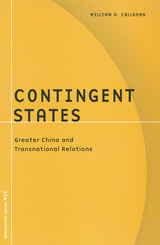

Cultural Revolution Culture, often denigrated as nothing but propaganda, was liked not only in its heyday but continues to be enjoyed today. A Continuous Revolution sets out to explain its legacy. By considering Cultural Revolution propaganda art—music, stage works, prints and posters, comics, and literature—from the point of view of its longue durée, Barbara Mittler suggests it was able to build on a tradition of earlier art works, and this allowed for its sedimentation in cultural memory and its proliferation in contemporary China.
Taking the aesthetic experience of the Cultural Revolution (1966–1976) as her base, Mittler juxtaposes close readings and analyses of cultural products from the period with impressions given in a series of personal interviews conducted in the early 2000s with Chinese from diverse class and generational backgrounds. By including much testimony from these original voices, Mittler illustrates the extremely multifaceted and contradictory nature of the Cultural Revolution, both in terms of artistic production and of its cultural experience.
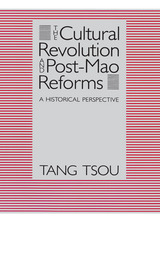
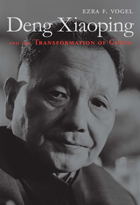
Winner of the Lionel Gelber Prize
National Book Critics Circle Award Finalist
An Economist Best Book of the Year | A Financial Times Book of the Year | A Wall Street Journal Book of the Year | A Washington Post Book of the Year | A Bloomberg News Book of the Year | An Esquire China Book of the Year | A Gates Notes Top Read of the Year
Perhaps no one in the twentieth century had a greater long-term impact on world history than Deng Xiaoping. And no scholar of contemporary East Asian history and culture is better qualified than Ezra Vogel to disentangle the many contradictions embodied in the life and legacy of China’s boldest strategist.
Once described by Mao Zedong as a “needle inside a ball of cotton,” Deng was the pragmatic yet disciplined driving force behind China’s radical transformation in the late twentieth century. He confronted the damage wrought by the Cultural Revolution, dissolved Mao’s cult of personality, and loosened the economic and social policies that had stunted China’s growth. Obsessed with modernization and technology, Deng opened trade relations with the West, which lifted hundreds of millions of his countrymen out of poverty. Yet at the same time he answered to his authoritarian roots, most notably when he ordered the crackdown in June 1989 at Tiananmen Square.
Deng’s youthful commitment to the Communist Party was cemented in Paris in the early 1920s, among a group of Chinese student-workers that also included Zhou Enlai. Deng returned home in 1927 to join the Chinese Revolution on the ground floor. In the fifty years of his tumultuous rise to power, he endured accusations, purges, and even exile before becoming China’s preeminent leader from 1978 to 1989 and again in 1992. When he reached the top, Deng saw an opportunity to creatively destroy much of the economic system he had helped build for five decades as a loyal follower of Mao—and he did not hesitate.
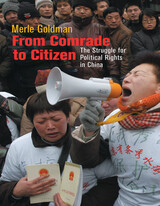
A leading scholar of China's modern political development examines the changing relationship between the Chinese people and the state. Correcting the conventional view of China as having instituted extraordinary economic changes but having experienced few political reforms in the post-Mao period, Merle Goldman details efforts by individuals and groups to assert their political rights.
China's move to the market and opening to the outside world have loosened party controls over everyday life and led to the emergence of ideological diversity. Starting in the 1980s, multi-candidate elections for local officials were held, and term limits were introduced for communist party leaders. Establishment intellectuals who have broken away from party patronage have openly criticized government policies. Those intellectuals outside the party structures, because of their participation in the Cultural Revolution or the 1989 Tiananmen Square demonstrations, have organized petitions, published independent critiques, formed independent groups, and even called for a new political system.
Despite the party's repeated attempts to suppress these efforts, awareness about political rights has been spreading among the general population. Goldman emphasizes that these changes do not guarantee movement toward democracy, but she sees them as significant and genuine advances in the assertion of political rights in China.
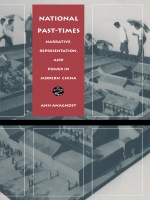
Using interviews and participant observation as well as close readings of official documents, propaganda materials, and popular media, Anagnost notes the discontinuities in the nation’s narrative—moments where this narrative has been radically reorganized at critical junctures in China’s modern history. Covering a broad range of issues relating to representation and power—issues that have presented themselves with particular clarity in the years since the violent crackdown on the student movement of 1989—National Past-Times critiques the ambiguous possibilities produced by the market, as well as new opportunities for "unfreedom" in the discipline of labor and the commodification of women. Anagnost begins with a retrospective reflection on the practice of "speaking bitterness" in socialist revolutionary practice. Subsequent essays discuss the culture debates of the 1980s, the discourse of social disorder, the issue of population control, the film The Story of Qiu Ju, and anomalies at the theme park "Splendid China."
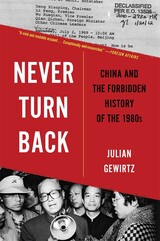
A Foreign Affairs Best Book of the Year
A BBC History Magazine Best Book of the Year
“Excellent…A fascinating, authoritative account of the paths for China’s future explored during a decade long buried by official, state-sponsored history.”—Julia Lovell, Foreign Policy
“A vivid and readable account…Exceptionally well-researched.” —Andrew Nathan, Foreign Affairs
"The definitive book on China in the 1980s in terms of the depth of research and originality of the argument." ―Minxin Pei, author of The Sentinel State
"A gift to our understanding of today’s China."―Evan Osnos, author of Age of Ambition
On a hike in Guangdong Province in January 1984, Deng Xiaoping was warned that his path was a steep and treacherous one. “Never turn back,” the Chinese leader replied. That became a mantra as the government forged ahead with reforms in the face of heated contestation over the nation’s future.
Recovering the debates of China in the 1980s, Julian Gewirtz traces the Communist Party’s diverse attitudes toward markets, state control, and sweeping technological change, as well as freewheeling public argument over political liberalization. Deng Xiaoping’s administration considered bold proposals from within the party and without, but after Tiananmen, Beijing systematically erased these discussions of alternative directions. Using newly available Chinese sources, Gewirtz details how the leadership purged the key reformist politician Zhao Ziyang, quashed the student movement, recast the transformations of the 1980s as the inevitable products of consensus, and indoctrinated China and the international community in the new official narrative.
Never Turn Back offers a revelatory look at how different China’s rise might have been and at the foundations of strongman rule under Xi Jinping, who has intensified the policing of history to bolster his own authority.
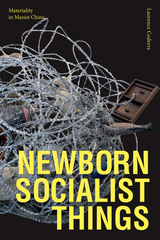

China’s bold program of reforms launched in the late 1970s—the move to a market economy and the opening to the outside world—ended the political chaos and economic stagnation of the Cultural Revolution and sparked China’s unprecedented economic boom. Yet, while the reforms made possible a rising standard of living for the majority of China’s population, they came at the cost of a weakening central government, increasing inequalities, and fragmenting society.
The essays of Barry Naughton, Joseph Fewsmith, Paul H. B. Godwin, Murray Scot Tanner, Lianjiang Li and Kevin J. O’Brien, Tianjian Shi, Martin King Whyte, Thomas P. Bernstein, Dorothy J. Solinger, David S. G. Goodman, Kristen Parris, Merle Goldman, Elizabeth J. Perry, and Richard Baum and Alexei Shevchenko analyze the contradictory impact of China’s economic reforms on its political system and social structure. They explore the changing patterns of the relationship between state and society that may have more profound significance for China than all the revolutionary movements that have convulsed it through most of the twentieth century.

In this first scientific survey of political participation in the People's Republic of China, Tianjian Shi identifies twenty-eight participatory acts and groups them into seven areas: voting, campaign activities, appeals, adversarial activities, cronyism, resistance, and boycotts. What he finds will surprise many observers. Political participation in a closed society is not necessarily characterized by passive citizens driven by regime mobilization aimed at carrying out predetermined goals. Beijing citizens acknowledge that they actively engage in various voluntary participatory acts to articulate their interests.
In a society where communication channels are controlled by the government, Shi discovers, access to information from unofficial means becomes the single most important determinant for people's engaging in participatory acts. Government-sponsored channels of appeal are easily accessible to ordinary citizens, so socioeconomic resources are unimportant in determining who uses these channels. Instead, voter turnout is found to be associated with the type of work unit a person belongs to, subjective evaluations of one's own economic status, and party affiliation. Those most likely to engage in campaign activities, adversarial activities, cronyism, resistance, and boycotts are the more disadvantaged groups in Beijing. While political participation in the West fosters a sense of identification, the unconventional modes of participation in Beijing undermine the existing political order.
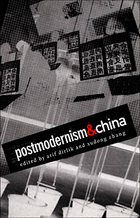
Collectively, these essays question the implications of specific phenomena, like literature, architecture, rock music, and film, in a postsocialist society. Some essays address China’s complicity in—as well as its resistance to—the culture of global capitalism. Others evaluate the impact of efforts to redefine national culture in terms of enhanced freedoms and expressions of the imagination in everyday life. Still others discuss the general relaxation of political society in post-Mao China, the emergence of the market and its consumer mass culture, and the fashion and discourse of nostalgia. The contributors make a clear case for both the historical uniqueness of Chinese postmodernism and the need to understand its specificity in order to fully grasp the condition of postmodernity worldwide. Although the focus is on mainland China, the volume also includes important observations on social and cultural realities in Hong Kong and Taiwan, whose postmodernity has so far been confined—in both Chinese and English-speaking worlds—to their economic and consumer activities instead of their political and cultural dynamism.
First published as a special issue of boundary 2, Postmodernism and China includes seven new essays. By juxtaposing postmodernism with postsocialism and by analyzing China as a producer and not merely a consumer of the culture of the postmodern, it will contribute to critical discourses on globalism, modernity, and political economics, as well as to cultural and Asian studies.
Contributors. Evans Chan, Arif Dirlik, Dai Jinhua, Liu Kang, Anthony D. King, Jeroen de Kloet, Abidin Kusno, Wendy Larson, Chaoyang Liao, Ping-hui Liao, Sebastian Hsien-hao Liao, Sheldon Hsiao-peng Lu, Wang Ning, Xiaobing Tang, Xiaoying Wang, Chen Xiaoming, Xiaobin Yang, Zhang Yiwu, Xudong Zhang
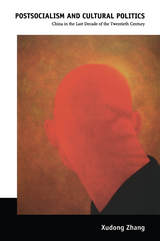
Zhang examines the reactions of intellectuals, authors, and filmmakers to the cultural and political conflicts in China during the 1990s. He offers a nuanced assessment of the changing divisions and allegiances within the intellectual landscape, and he analyzes the postsocialist realism of the era through readings of Mo Yan’s fiction and the films of Zhang Yimou. With Postsocialism and Cultural Politics, Zhang applies the same keen insight to China’s long 1990s that he brought to bear on the 1980s in Chinese Modernism in the Era of Reforms.
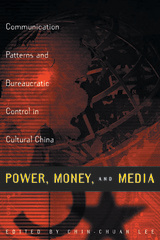
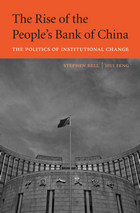
With $4.5 trillion in total assets, the People’s Bank of China now surpasses the U.S. Federal Reserve as the world’s biggest central bank. The Rise of the People’s Bank of China investigates how this increasingly authoritative institution grew from a Leninist party-state that once jealously guarded control of banking and macroeconomic policy. Relying on interviews with key players, this book is the first comprehensive and up-to-date account of the evolution of the central banking and monetary policy system in reform China.
Stephen Bell and Hui Feng trace the bank’s ascent to Beijing’s policy circle, and explore the political and institutional dynamics behind its rise. In the early 1990s, the PBC—benefitting from political patronage and perceptions of its unique professional competency—found itself positioned to help steer the Chinese economy toward a more liberal, market-oriented system. Over the following decades, the PBC has assumed a prominent role in policy deliberations and financial reforms, such as fighting inflation, relaxing China’s exchange rate regime, managing reserves, reforming banking, and internationalizing the renminbi. Today, the People’s Bank of China confronts significant challenges in controlling inflation on the back of runaway growth, but it has established a strong track record in setting policy for both domestic reform and integration into the global economy.

Along with the political and economic reforms that have characterized the post-Mao era in China there has been a potentially revolutionary change in Chinese science and technology. Here sixteen scholars examine various facets of the current science and technology scene, comparing it with the past and speculating about future trends.
Two chapters dealing with science under the Nationalists and under Mao are followed by a section of extensive analysis of reforms under Deng Xiaoping, focusing on the organizational system, the use of human resources, and the emerging response to market forces. Chapters dealing with changes in medical care, agriculture, and military research and development demonstrate how these reforms have affected specific areas during the Chinese shift away from Party orthodoxy and Maoist populism toward professional expertise as the guiding principle in science and technology. Three further chapters deal with China’s interface with the world at large in the process of technology transfer.
Both the introductory and concluding chapters describe the tension between the Chinese Communist Party structure, with its inclinations toward strict vertical control, and the scientific and technological community’s need for a free flow of information across organizational, disciplinary, and national boundaries.
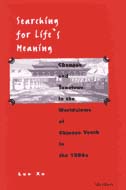
Drawing on his own experience as a teacher at Capital Normal University in Beijing, China during the 1980s, as well as exhaustive research, Luo Xu investigates the social and political climate of 1980s China in order to help better define the culture that ultimately drove the events at Tiananmen. Supporting his arguments with solid primary source documents, Xu contends that the contemplation of the meaning of life, along with other philosophical questions, were integral components of the general social crisis leading up to the movement of 1989.
Elegantly written and accessible to a general readership, this study will also be useful to specialists. Searching for Life's Meaning is a concise but detailed introduction to the mentalities of the Chinese generation presently assuming leadership in China. It should be valuable reading in courses on Chinese history and politics, and will be of interest to scholars in the related fields of Asian studies, anthropology, cultural studies, and youth studies. The book will also appeal to business- people and other professionals concerned with managing relations with the world's fastest growing polity.
Luo Xu is Assistant Professor of History, State University of New York College at Cortland.

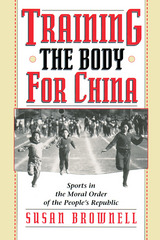
Training the Body for China is the first book on Chinese sports based on extended fieldwork by a Westerner. Brownell introduces the notion of "body culture" to analyze Olympic sports as one element in a whole set of Chinese body practices: the "old people's disco dancing" craze, the new popularity of bodybuilding (following reluctant official acceptance of the bikini), mass calisthenics, martial arts, military discipline, and more.
Translating official and dissident materials into English for the first time and drawing on performance theory and histories of the body, Brownell uses the culture of the body as a focal point to explore the tensions between local and global organizations, the traditional and the modern, men and women. Her intimate knowledge of Chinese social and cultural life and her wide range of historic examples make Training the Body for China a unique illustration of how gender, the body, and the nation are interlinked in Chinese culture.
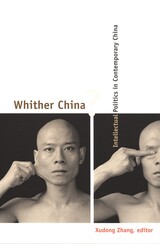
The contributors to Whither China? describe how, instead of spearheading the popular-mandated and state-sanctioned project of modernization, intellectuals now find themselves caught amid rapidly changing structures of economic, social, political, and cultural relations that are both global in nature and local in an irreducibly political sense. Individual essays interrogate the space of Chinese intellectual production today, lay out the issues at stake, and cover major debates and discursive interventions from the 1990s. Those who write within the Chinese context are joined by Western observers of contemporary Chinese cultural and intellectual life. Together, these two groups undertake a truly international intellectual struggle not only to interpret but to change the world.
Contributors. Rey Chow, Zhiyuan Cui, Michael Dutton, Gan Yang, Harry Harootunian, Peter Hitchcock, Rebecca Karl, Louisa Schein, Wang Hui, Wang Shaoguang, Xudong Zhang
READERS
Browse our collection.
PUBLISHERS
See BiblioVault's publisher services.
STUDENT SERVICES
Files for college accessibility offices.
UChicago Accessibility Resources
home | accessibility | search | about | contact us
BiblioVault ® 2001 - 2024
The University of Chicago Press









